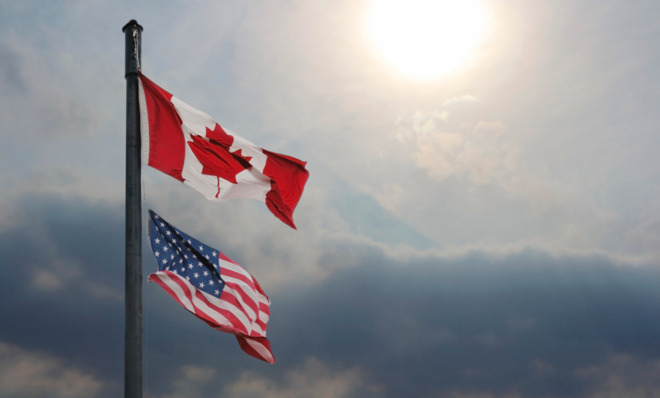No, ObamaCare isn't a Canadian-style 'Ponzi scheme'
Celebrity Suzanne Somers warns of the Canadian apocalypse

ObamaCare has very real, disconcerting problems, including a glitchy website, a penchant for sending error-ridden or duplicate applications to insurance companies, and, for a small percentage of the population, the "sticker shock" of higher premiums.
ObamaCare will not, however, turn America into Canada, which, according to a new Wall Street Journal editorial by Suzanne Somers, pretty much sounds like hell on earth. Somers is not a medical expert. She is the former star of Three's Company and Step by Step, a writer of several diet books, and a proponent of using alternative medicine instead of chemotherapy to treat cancer — a position that earned her a strong condemnation by the American Cancer Society.
Regardless, she decided to weigh in on ObamaCare, calling it "socialized medicine" and "a greater Ponzi scheme than that pulled off by Bernie Madoff."
The Week
Escape your echo chamber. Get the facts behind the news, plus analysis from multiple perspectives.

Sign up for The Week's Free Newsletters
From our morning news briefing to a weekly Good News Newsletter, get the best of The Week delivered directly to your inbox.
From our morning news briefing to a weekly Good News Newsletter, get the best of The Week delivered directly to your inbox.
Her argument, strangely enough, centers around Canadian doctors not being able to make enough money. Citing an article in the magazine Maclean's, she argues that there is a "great surge of Canadian students becoming veterinarians" because their salaries are too low — leading to lengthy waits and poorer quality care.
She also claims that her husband, Canadian talk show host Alan Hamel, has watched his doctor cousins move "to the United States because after their years of intensive schooling, they want to reap financial rewards."
Dr. Aaron E. Carroll, director of Indiana University's Center for Health Policy and Professionalism Research, argues otherwise, using data instead of anecdotes:
So when emigration "spiked" [in the mid-1990s], 400 to 500 doctors were leaving Canada for the United States. There are more than 800,000 physicians in the United States right now, so I'm skeptical that every doctor knows one of those emigres.... In 2003, net emigration became net immigration. Let me say that again. More doctors were moving into Canada than were moving out. [The Incidental Economist]
That trend has remained consistent since 2003. Carroll also takes issue with another anecdote shared by Somers, in which she claims her "75-year-old Canadian girlfriend was denied treatment because she was too old." He argues "there is no evidence for Canadian doctors withholding care from people because they are old."
A free daily email with the biggest news stories of the day – and the best features from TheWeek.com
But what about wait times? Here is Somers again:
My sister-in-law had to wait two months to get a general practitioner. During this period she spent her days in bed vomiting continuously, unable to get any food or drink down because she couldn't get an appointment with the doctor. When she finally did, the doctor said, "Oh, you don't need me, you need a specialist." That took another two weeks until she got a pill that corrected the problem. [Wall Street Journal]
Here, Somers' anecdote is not necessarily misleading: It's true that people in Canada have to wait longer to see their doctors. Some groups, like the Fraser Institute, a conservative (by Canadian standards) think tank, are pushing for market-based options to offer alongside universal health care, as is done in Australia and Switzerland.
But Carroll argues that Canadians wait longer for health care because, as they use a single-payer system, the government has made "a conscious decision to hold down costs." That has led to the average Canadian spending $4,000 less on health care than the average American, according to the Organization for Economic Cooperation and Development (OECD).
Here, of course, is the biggest problem with Somers' comparison of ObamaCare to Canada's healthcare system: The former isn't a single-payer system at all. It's a market-based system modeled on something implemented by a Republican governor in Massachusetts.
As Canadian-born Washington Post writer Sarah Kliff explained in July, the Canadian system "sponsors health insurance for all citizens, regardless of income or age," while the Affordable Care Act increases access to health insurance via government subsidies and increased Medicaid coverage.
It's fair, and quite frankly necessary, to question the implementation and effects of ObamaCare. But invoking the Canadian single-payer bogeyman distracts from the real problems with the Affordable Care Act that need fixing. And using red-baiting quotes of dubious origin to caricature the law? That's just ridiculous.
An earlier version of this post contained a quotation attributed to Lenin ("Socialized medicine is the keystone to the arch of the socialist state") that has been widely disputed. And it included a quotation attributed to Churchill ("Control your citizens' health care and you control your citizens") that the Journal has been unable to confirm. [Wall Street Journal]
Keith Wagstaff is a staff writer at TheWeek.com covering politics and current events. He has previously written for such publications as TIME, Details, VICE, and the Village Voice.
-
 Dive right into these 8 underwater adventures
Dive right into these 8 underwater adventuresThe Week Recommends It’s time to make a splash
-
 The world’s oldest rock art reveals hints about human migration
The world’s oldest rock art reveals hints about human migrationUnder the Radar The art is believed to be over 67,000 years old
-
 Grok in the crosshairs as EU launches deepfake porn probe
Grok in the crosshairs as EU launches deepfake porn probeIN THE SPOTLIGHT The European Union has officially begun investigating Elon Musk’s proprietary AI, as regulators zero in on Grok’s porn problem and its impact continent-wide
-
 The billionaires’ wealth tax: a catastrophe for California?
The billionaires’ wealth tax: a catastrophe for California?Talking Point Peter Thiel and Larry Page preparing to change state residency
-
 Bari Weiss’ ‘60 Minutes’ scandal is about more than one report
Bari Weiss’ ‘60 Minutes’ scandal is about more than one reportIN THE SPOTLIGHT By blocking an approved segment on a controversial prison holding US deportees in El Salvador, the editor-in-chief of CBS News has become the main story
-
 Has Zohran Mamdani shown the Democrats how to win again?
Has Zohran Mamdani shown the Democrats how to win again?Today’s Big Question New York City mayoral election touted as victory for left-wing populists but moderate centrist wins elsewhere present more complex path for Democratic Party
-
 Millions turn out for anti-Trump ‘No Kings’ rallies
Millions turn out for anti-Trump ‘No Kings’ ralliesSpeed Read An estimated 7 million people participated, 2 million more than at the first ‘No Kings’ protest in June
-
 Ghislaine Maxwell: angling for a Trump pardon
Ghislaine Maxwell: angling for a Trump pardonTalking Point Convicted sex trafficker's testimony could shed new light on president's links to Jeffrey Epstein
-
 The last words and final moments of 40 presidents
The last words and final moments of 40 presidentsThe Explainer Some are eloquent quotes worthy of the holders of the highest office in the nation, and others... aren't
-
 The JFK files: the truth at last?
The JFK files: the truth at last?In The Spotlight More than 64,000 previously classified documents relating the 1963 assassination of John F. Kennedy have been released by the Trump administration
-
 'Seriously, not literally': how should the world take Donald Trump?
'Seriously, not literally': how should the world take Donald Trump?Today's big question White House rhetoric and reality look likely to become increasingly blurred